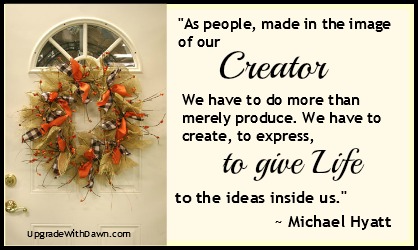How to Become a More Influential Storyteller
Maria Keckler knows how to build effective bridges between people and to her audiences. In this Influence UPGRADE, she helps us focus on the gift of storytelling.
UPGRADE, she helps us focus on the gift of storytelling.
“Jesus got the attention of his audiences, stirred their emotions, and helped them remember key messages because he presented principles through the best communication vehicle at our disposal: Story,” Maria says.
“You have an important message to share. Shouldn’t it be delivered well?”
Brevity is not my (Dawn's) strength in public speaking, and I can learn from Maria today; but I know the power of storytelling in driving a message home. Thankfully, both are skills we can learn.
Maria continues . . .
“Stacie, my sixteen-year-old daughter, was outgoing and beautiful, full of hopes and dreams. Until one man destroyed them in a single moment. He stalked our family for two weeks and waited until Stacie was home alone….”
Lorraine’s gripping story spells out one key message: Through the power of Jesus, one can forgive and still make an impact despite terrible loss.
You can become a more influential communicator—whether sharing your testimony or your next marketing idea—by learning to be a more compelling storyteller.
Sometimes a Powerful Story is Only ONE Chapter of a Bigger Story.
Lorraine’s story of loss and forgiveness is by no means her complete testimony as a disciple of Jesus Christ. It is, however, one chapter God is using to bring thousands of incarcerated men and women to faith through her prison ministry.
So the question at hand is—how do we share powerful stories, without rambling, so that we earn the right to share more or have the opportunity to influence others in positive ways?
Four Steps to Sharing Stories Like Jesus Did
First: Embrace empathy.
How? Learn to consider the needs of your audiences. You can read more about what that looks like in my previous article.
Second: Share only one story at a time.
Whether he addressed the Pharisees, the masses, or his disciples—Jesus shared one complete story at a time. Each story had a clear beginning, middle, and end that drove home a key message for a particular audience.
Third: Choose vivid word pictures.
Jesus’ stories were rich with concrete and vivid details that evoked the senses.
Even today, we can almost see and smell the oil and wine the Good Samaritan poured on the wounds of the beaten traveler. We can picture the Prodigal Son contemplating the food of swine—and leap with joy as the father runs to welcome him home.
Fourth: Practice brevity.
In the words of Max Lucado, “We learn brevity from Jesus. His greatest sermon can be read in eight minutes (Matthew 5-7). His best-known story can be read in 90 seconds (Luke 15:11-32). He summarized prayer in five phrases (Matthew 6:9-13), and he reduced all his teachings to one command (John 15:12). He made his point and went home.”
Bottom line:
We all must overcome the temptation to share our entire life story or grand idea in one sitting. It’s helpful to think of our opportunity to share as one piece of a larger story.
Start applying the previous lessons by answering these questions:
- What stories do I want or need to share with others?
- What story is best suited for the audience God has given me today?
- What is the key takeaway of my story?
- What vivid details can I use to evoke my audience’s senses?
- How can I be as brief as Jesus?
God is using one of Lorraine’s stories to bring a message of hope, forgiveness, and redemption to imprisoned men and women. As you continue preparing to share yours well, God will provide a larger audience for you too.
 Maria Keckler is the author of Bridge-Builders: How Superb Communicators Get What They Want in Business and in Life. Maria is an executive coach, corporate
Maria Keckler is the author of Bridge-Builders: How Superb Communicators Get What They Want in Business and in Life. Maria is an executive coach, corporate trainer, and the President of Superb Communication. With her husband, Sam, Maria has also been helping married couples improve their communication. Check out Maria's blog!
trainer, and the President of Superb Communication. With her husband, Sam, Maria has also been helping married couples improve their communication. Check out Maria's blog!
Graphic adapted, courtesy of Andrew Phillips, Stocksnapio.
 Post a Comment → Posted on
Post a Comment → Posted on  Tuesday, November 10, 2015 at 6:20AM
Tuesday, November 10, 2015 at 6:20AM  Brevity,
Brevity,  Bridge Builders,
Bridge Builders,  Empathy,
Empathy,  Influential Storyteller,
Influential Storyteller,  Maria Keckler,
Maria Keckler,  Max Lucado quote,
Max Lucado quote,  Storytelling,
Storytelling,  Tell Stories Like Jesus Did,
Tell Stories Like Jesus Did,  Upgrade with Dawn,
Upgrade with Dawn,  Word Pictures Upgrade Your Life
Word Pictures Upgrade Your Life  Influence,
Influence,  Upgrade - General
Upgrade - General 














